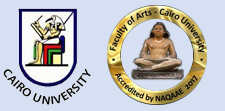عنوان المقال عربي
أُسُسُ الفَتْوَىَ في کِتَابِ (المُوافَقَات في أُصولِ الشَّرِيعَة) للشَّاطِبِيِّ (ت:790 هـ)
Document Type
Original Study
كلمات مفتاحية عربي
موازین الفتوى المقبولة, أسس الفتوى عند الشاطبی, أسس الفتوى فی الموافقات, المقومات التی ترتکز علیها الفتوى
Abstract English
The discussion in this research was limited to the most important pillars of the fatwa of Imam Al-Shatibi; This is due to the presence of a strong relationship between it and the reality of the fatwa, which would contribute to raising the fatwa to a degree of influence in order to adapt to the needs of the people. Search this subject has shown how identified Imam Shatby in his book (approvals) components and assets that underpin the fatwa, revealing the search for the most important qualities identified by Imam Shatby that, which must be characterized by even the mufti in order to be eligible for an advisory opinion. The research proved that Al-Shatiby - in his approach - laid the scientific foundations, and identified the main pillars and legal controls of the fatwa. Those pillars were represented as follows: ** The first basis: The mufti is standing in the nation and takes the place of the Prophet - may God’s prayers and peace be upon him. ** The second basis: The fatwa from the mufti is obtained in terms of speech, action, and affirmation. ** The third basis: the invalidity of a fatwa that goes against the requirements of science. ** The Fourth Basis: A mufti who has reached the peak of his degree is the one who holds people to the average standard in what befits them; It does not lead them to the doctrine of distress, nor does it incline them to the edge of dissolution.
الملخص العربي
إنَّ الحَديثَ عَنْ الفَتْوَى عِنْدَ الإمَام الشَّاطِبِيّ أَمْرٌ بَالِغُ الأَهَمِّيَّة، خَاصَّةً في عَصْرِنَا المَوْسُوم بِالتَّعْقِيدِ، وَتَعَدُّدِ المُسْتَجَدَّاتِ وَالنَّوازِلِ، وَالتَّغْييرِ السَّريعِ الذي طَالَ جُلّ مَناحي الحَياة؛ فالإمَامُ الشَّاطِبِيُّ ذَکَرَ في کِتَابِهِ القَيِّمِ (المُوافَقَات) مجموعة من الموازين الدَّقيقَة التي تُصَحَّحُ بِاعْتِمَادِهَا وَالرُّجوعِ إليْهَا الکثير مِنَ المَفَاهيمِ، وَتُحَدَّدُ بها القَواعِدَ التي لَوْ رُوعِيَتْ لَتَمَکَّنَ أَهْل العِلْمِ مِنْ حُسْنِ تَنْزيلِ الأَحْکَامِ عَلَىَ الوَاقِعِ. وقد اقتصر الحديث في هذا البحث عَلَىَ أَهَمِّ رَکائِزِ الفَتْوَىَ عِنْدَ الإمَامِ الشَّاطِبِيّ. وترجع الرغبة في تَخْصِيصِ هَذِهِ الرَّکَائِزِ بِالبَيَانِ وَالتَّفْصِيلِ إلى ملاحظة وجود علاقة قوية بَيْنَ الرَّکائِزِ المَذْکورَةِ وَوَاقِعِ الفَتْوَىَ، و هو أَمْرٌ منْ شَأنِهِ الإسهام في الارْتِقَاءِ بِالفَتْوَىَ إلَى دَرَجَةِ التَّأْثيرِ لِتَتَکَيَّف حَيَاة النَّاسِ أَفْرَادًا وَجَمَاعَاتٍ مَعَ الأَحْکَامِ الشَرْعِيَّةِ. وقد أَظْهَرَ البحثُ في ذَلِکَ الموضوع کيفَ حَدَّدَ الإمَامُ الشَّاطِبِيُّ في کِتابِهِ (الموافقات) المُقَوِّمَاتِ وَالأصولَ التي تَرْتَکِزُ عَلَيْهَا الفَتْوَىَ، وَکَشَفَ البَحْثُ عن أَهَمَّ الصِّفَاتِ التي حَدَّدَها الإمِامُ الشَّاطِبِيُّ، والتي يَجِبُ أنْ يَتِّصِفَ بِهَا حتى المفتي حتى يکون مُؤهلاً للفتوى. وقد أثبتَ البحث أنَّ الشَّاطبيُّ- في نَهْجِهِ هذا- قَدْ وَضَعَ الأُسَسَ العِلْمِيَّةَ، وَحدَّدَ المُرْتَکَزَات الأَسَاسِيَّةَ وَالضَّوابِطَ الشَّرْعِيَّةَ للفَتْوَىَ، وهو الأَمْرُ الذي ظَهَرَ جَلِيًّا مِنْ خِلالِ تَطَرَّقِهِ للحديثِ عَنْ هَذِهِ المُرْتَکَزَاتِ وَالخَصَائِصِ المُمَيِّزَةِ لِمَنْهَجِهِ في الإفْتَاءِ وَالاجْتِهَادِ في أَبْوابٍ مُخْتَلِفَةٍ مِنْ کِتَابِهِ هَذَ
Recommended Citation
Wafiq, Ahmed ,
(2021)
"The foundations of the fatwa in the book (Al-Muwafaqat fi Usul Al-Shari’ah) by Al-Shatiby (T: 790 A.H.),"
Journal of the Faculty of Arts (JFA): Vol. 81:
Iss.
4, Article 15.
DOI: https://doi.org/10.21608/jarts.2021.49380.1027
Digital Object Identifier (DOI)
10.21608/jarts.2021.49380.1027
Accept Date
2021-02-18
Publication Date
10-1-2021

